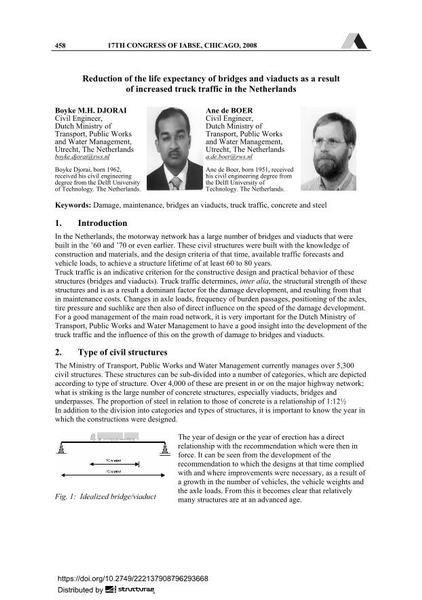Reduction of the life expectancy of bridges and viaducts as a result of increased truck traffic in the Netherlands

|
|
|||||||||||
Détails bibliographiques
| Auteur(s): |
Boyke Djorai
Ane de Boer |
||||
|---|---|---|---|---|---|
| Médium: | papier de conférence | ||||
| Langue(s): | anglais | ||||
| Conférence: | 17th IABSE Congress: Creating and Renewing Urban Structures – Tall Buildings, Bridges and Infrastructure, Chicago, USA, 17-19 September 2008 | ||||
| Publié dans: | IABSE Congress Chicago 2008 | ||||
|
|||||
| Page(s): | 458-459 | ||||
| Nombre total de pages (du PDF): | 9 | ||||
| Année: | 2008 | ||||
| DOI: | 10.2749/222137908796293668 | ||||
| Abstrait: |
In the Netherlands, the motorway network has a large number of bridges and viaducts that were built in the ’60 and ’70 or even earlier. These civil structures were built with the knowledge of construction and materials, and the design criteria of that time, available traffic forecasts and vehicle loads, to achieve a structure lifetime of at least 60 to 80 years. Truck traffic is an indicative criterion for the constructive design and practical behavior of these structures (bridges and viaducts). Truck traffic determines, inter alia, the structural strength of these structures and is as a result a dominant factor for the damage development, and resulting from that in maintenance costs. Changes in axle loads, frequency of burden passages, positioning of the axles, tire pressure and suchlike are then also of direct influence on the speed of the damage development. For a good management of the main road network, it is very important for the Dutch Ministry of Transport, Public Works and Water Management to have a good insight into the development of the truck traffic and the influence of this on the growth of damage to bridges and viaducts. |
||||
